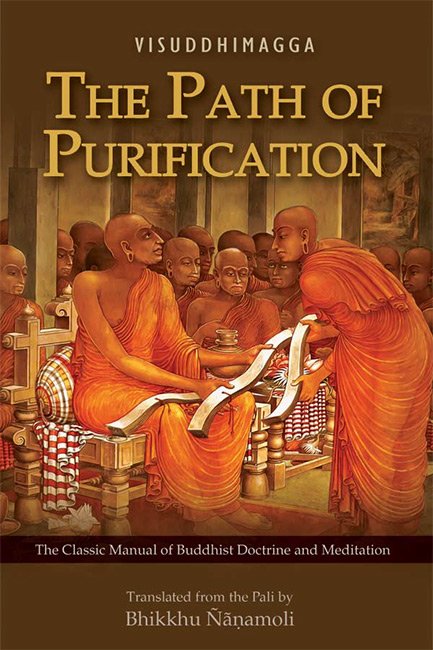Visuddhimagga (the pah of purification)
by Ñāṇamoli Bhikkhu | 1956 | 388,207 words | ISBN-10: 9552400236 | ISBN-13: 9789552400236
This page describes (5) Recollection of the Generosity of the section Six Recollections (Cha-anussati-niddesa) of Part 2 Concentration (Samādhi) of the English translation of the Visuddhimagga (‘the path of purification’) which represents a detailled Buddhist meditation manual, covering all the essential teachings of Buddha as taught in the Pali Tipitaka. It was compiled Buddhaghosa around the 5th Century.
(5) Recollection of the Generosity
107. One who wants to develop the recollection of generosity should be naturally devoted to generosity and the constant practice of giving and sharing. Or alternatively, if he is one who is starting the development of it, he should make the resolution: “From now on, when there is anyone present to receive, I shall not eat even a single mouthful without having given a gift.” And that very day he should give a gift by sharing according to his means and his ability with those who have distinguished qualities. When he has apprehended the sign in that, he should go into solitary retreat and recollect his own generosity in its special qualities of being free from the stain of avarice, etc., as follows:
“It is gain for me, it is great gain for me, that in a generation obsessed by the stain of avarice I abide with my heart free from stain by avarice, and am freely generous and open-handed, that I delight in relinquishing, expect to be asked, and rejoice in giving and sharing” (A III 287).
108. Herein, it is gain for me: it is my gain, advantage. The intention is: I surely partake of those kinds of gain for a giver that have been commended by the Blessed One as follows: “A man who gives life [by giving food] shall have life either divine or human” (A III 42), and: “A giver is loved and frequented by many” (A III 40), and: “One who gives is ever loved, according to the wise man’s law” (A III 41), and so on.
109. It is great gain for me: it is great gain for me that this Dispensation, or the human state, has been gained by me. Why? Because of the fact that “I abide with my mind free from stain by avarice … and rejoice in giving and sharing.”
110. Herein, obsessed by the stain of avarice is overwhelmed by the stain of avarice. Generation: beings, so called owing to the fact of their being generated. So the meaning here is this: among beings who are overwhelmed by the stain of avarice, which is one of the dark states that corrupt the [natural] transparency of consciousness (see A I 10) and which has the characteristic of inability to bear sharing one’s own good fortune with others.
111. Free from stain by avarice because of being both free from avarice and from the other stains, greed, hate, and the rest. I abide with my heart: I abide with my consciousness of the kind already stated, is the meaning. [224] But in the sutta, “I live the home life with my heart free” (A III 287; V 331), etc., is said because it was taught there as a [mental] abiding to depend on [constantly] to Mahānāma the Sakyan, who was a stream-enterer asking about an abiding to depend on. There the meaning is “I live overcoming …”
112. Freely generous: liberally generous. Open-handed: with hands that are purified. What is meant is: with hands that are always washed in order to give gifts carefully with one’s own hands. That I delight in relinquishing: the act of relinquishing (vossajjana) is relinquishing (vossagga); the meaning is, giving up. To delight in relinquishing is to delight in constant devotion to that relinquishing. Expect to be asked (yācayoga): accustomed to being asked (yācana-yogga) because of giving whatever others ask for, is the meaning. Yājayoga is a reading, in which case the meaning is: devoted (yutta) to sacrifice (yāja), in other words, to sacrificing (yajana). And rejoice in sharing: the meaning is, he recollects thus: “I give gifts and I share out what is to be used by myself, and I rejoice in both.”
113. As long as he recollects his own generosity in its special qualities of freedom from stain by avarice, etc., in this way, then: “On that occasion his mind is not obsessed by greed, or obsessed by hate, or obsessed by delusion; his mind has rectitude on that occasion, being inspired by generosity” (A III 287).
So when he has suppressed the hindrances in the way already described (§66), the jhāna factors arise in a single conscious moment. But owing to the profundity of the generosity’s special qualities, or owing to his being occupied in recollecting the generosity’s special qualities of many sorts, the jhāna is only access and does not reach absorption. And that access jhāna is known as “recollection of generosity” too because it arises with the generosity’s special qualities as the means.
114. And when a bhikkhu is devoted to this recollection of generosity, he becomes ever more intent on generosity, his preference is for non-greed, he acts in conformity with loving-kindness, he is fearless. He has much happiness and gladness. And if he penetrates no higher, he is at least headed for a happy destiny.
Now, when a man is truly wise,
His constant task will surely be
This recollection of his giving
Blessed with such mighty potency.
This is the section dealing with the recollection of generosity in the detailed explanation. [225]
